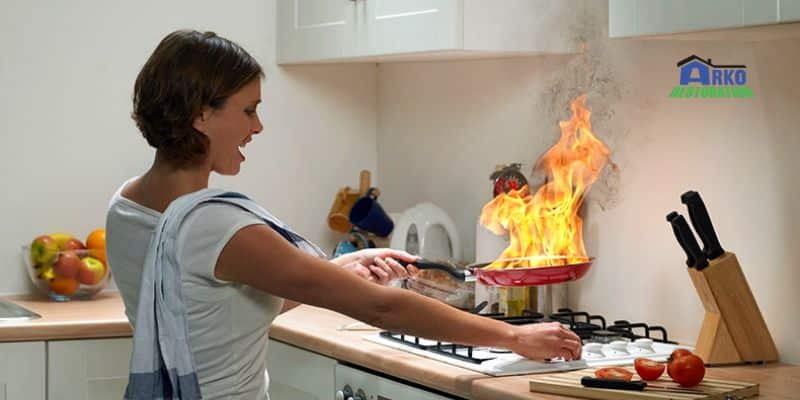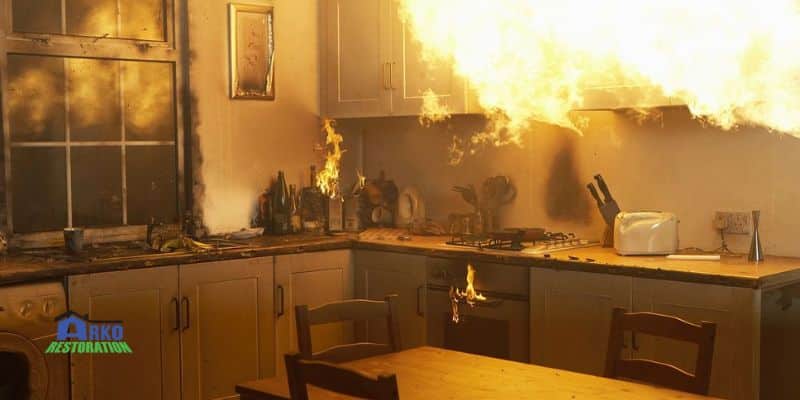A house fire is an extremely terrifying experience, and most of the time, it starts in the kitchen. Even though cooking at home is enjoyable for many people, there are serious risks involved. There are different causes of fire and knowing them will help you prevent an incident.
5 Most Common Causes of Kitchen Fires
There is always a chance of fire when you turn on your stove or light a burner. Even with caution, fires can still happen. Here are the top five typical reasons for kitchen fires:
1. Food

Cooking is a common task that can pose fire hazards if not approached with caution. Certain foods tend to burn easily, increasing the risk of kitchen fires, which can quickly escalate beyond spoiling what you are cooking.
To prevent such incidents, you must stay vigilant while cooking. This includes monitoring the stovetop, adjusting the heat accordingly, stirring the food regularly, and keeping track of cooking times.
If flames appear, immediately remove the food from the heat to prevent a fire from developing. By following these simple measures, you can significantly reduce the likelihood of kitchen fires caused by burning food.
2. Unattended cooking equipment
Many kitchen fires arise from a lapse in attention. A momentary distraction can have devastating consequences. The very elements of cooking – oil, grease, and heat – create a perfect storm for fire when focus is lost.
Whether it is checking a phone notification or engaging in a lively chat, diverting attention from cooking can result in disaster. To prevent these incidents, you must reduce distractions that could pull focus away from what you are doing in the kitchen.
By developing a habit of undivided attention in the kitchen, you can significantly reduce the risk of unattended cooking equipment starting a fire. This can help foster a safer cooking environment and minimize the potential need for fire restoration in the long run.
3. Frying

Kitchen fires are a common occurrence, and frying is a common cause. When frying food, it is essential to be extra careful, as hot oil can easily ignite and cause serious burns.
To prevent kitchen mishaps, always stay close to the stove when frying and use only the necessary amount of oil. If you notice the oil starting to smoke or catch fire, immediately turn off the heat or remove the pan from the heat source.
By taking these simple precautions, you can help keep your kitchen safe and prevent both fires and injuries.
4. Clothing
Clothes are a flammable material even though it is not as dangerous as other kitchen items. As a result, when a spark comes into contact with clothing, fire can spread fast. Clothing is a common cause of kitchen fires. Take care of your clothing when you cook.
Additionally, it is flammable, so stay away from clothing with long, loose sleeves that might come into contact with the flame.
Furthermore, stay away from leaning too close to a burning burner to prevent your clothing from catching fire. If at all possible, wear an apron to protect your clothes and maintain their cleanliness.
5. Flammable items near the stove
While having frequently used items within easy reach is convenient, it’s crucial to avoid cluttering the cooking area with flammable objects. Kitchens are home to various combustible materials, such as wooden utensils, rags, hand towels, napkins, paper towels, fabric oven mitts, and even clothing.
To prevent potential fire hazards, it is essential to keep items that are flammable away from the stovetop and open flames. By designating a safe and secure storage area for these items, you minimize the risk of accidental contact with flames, significantly enhancing kitchen safety.
Maintaining a clutter-free and organized cooking space is an essential step in preventing kitchen fires and promoting overall safety.
General Tips for Preventing Kitchen Fires
Preventing kitchen fires is essential for the safety of your home. Here are some general tips to minimize the risk of kitchen fires:
- Stay attentive: Cooking should never be done in an unattended kitchen. To avoid any fire hazards, always turn off the stove if you must step away, even for a short while.
- Clear clutter: Keep a clear area around heat sources at all times to improve kitchen safety. To reduce the chance of a fire, keep combustible materials like paper, towels, and wooden utensils at a safe distance away from the stove.
- Proper clothing: Be conscious about your type of clothing before going into the kitchen. Choose clothing with tight-fitting or short sleeves rather than loose or long sleeves that could easily catch fire. Make safety your top priority to reduce the likelihood of mishaps.
- Regular maintenance: Cooking appliances, especially stoves and ovens, should be routinely cleaned and inspected for wear or malfunctions to maintain a safe kitchen. By doing this, the risk of a fire is decreased and their correct operation is guaranteed.
- Keep a fire extinguisher: Make sure everyone in the home knows how to use the fire extinguisher and keep one handy in the kitchen. This essential tool can put out small fires quickly before they get out of control.
- Grease management: When using oils and fats in cooking, do so with caution. Keep an eye on things at all times and keep a lid close at hand to quickly put out any possible flare-ups so that the risk of fire in the kitchen does not get worse.
Conclusion
Fires can still happen even in cases where cooks exercise extreme caution. If this does happen to you, you need to remain calm and take quick action. When a fire is put out, it frequently leaves behind significant damage that needs to be restored to get your kitchen back in shape. A professional can help you with that. Also, the general tips discussed will help prevent kitchen fires.

